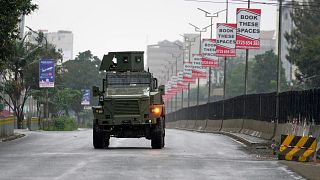Kenya
Kenyans waited feverishly Wednesday for the results of the elections held the day before to find out whether veteran Raila Odinga or incumbent Vice President William Ruto will be their next president.
The two favourites, out of the four candidates in the race, have assured that they will recognize the results. But the country feared on Wednesday that it would once again be caught up in a familiar post-election saga, with every election since 2002 contested in this East African country considered a democratic anchor in the region.
Unless one of the candidates receives more than 50% of the vote and is directly elected, the two leading candidates will face each other in a second round within 30 days.
The pressure is therefore mounting on the Independent Election Commission (ICBC), which must declare the results by August 16.
Its officials worked hard throughout the night, under the eyes of thousands of observers, to continue the count and allay fears of rigging.
By 06:00 (03:00 GMT), more than 90% of the presidential results forms had been received and the two heavyweights appeared to be neck and neck.
The process could be long before the final results, however, and the IEBC warned on Tuesday night that Kenyans should be patient.
"We are working to complete" the counting and verification of results "as soon as possible," said IEBC chairman Wafula Chebukati.
The IEBC, which is under even more pressure after it was already incriminated for irregularities in the 2017 polls, will also have to explain the technological failures and other incidents that have occurred since Monday, which have included the cancellation of six local polls.
- "No change" -
Kenyans went to the polls to choose Uhuru Kenyatta's successor -- a member of the influential Kikuyu community in power since 2013, but also their parliamentarians, governors and local elected officials.
The day of voting was "relatively calm and peaceful," according to police.
Despite the long queues that stretched into the morning, often before dawn, turnout appeared to be down in some areas. Of the 22.1 million voters, just over half had cast their ballots by 4:00 p.m. (13:00 GMT).
Two favourites have emerged in the presidential race.
The first, Raila Odinga, 77 and a member of the Luo ethnic group, is the opposition leader supported since 2018 by Kenyatta's party, in a surprising but typical move in Kenya's highly volatile politics.
The second, William Ruto, a 55-year-old sulphurous businessman, a Kalenjin who is running in opposition to the "dynasties" embodied by Mr. Kenyatta and Mr. Odinga, heirs of two families at the heart of Kenyan politics since independence in 1963.
Their campaign promises, focused on purchasing power and fighting corruption, have not necessarily convinced Kenyans, about a third of whom live in poverty.
"We have elections, we get promises but we don't see any change," lamented George Otieno Henry, a 56-year-old artisan. "I hope this time it will be better," he pleaded from Kibera, a huge slum in Nairobi.
In 2017, turnout was close to 80%. But the August 2017 presidential election was invalidated by the courts for "irregularities" and then rescheduled, denting the reputation of the IEBC.
Since then, political alliances have changed. But corruption has remained endemic and the effects of the pandemic, the war in Ukraine and the ongoing drought have exacerbated already glaring inequalities and dominated the campaign. The soaring cost of living may also have supplanted the traditional tribal vote at the polling booth, analysts say.
Both Odinga and Ruto have promised a brighter economic future for the under-34s, who make up three-quarters of the population but are particularly hard hit by unemployment.
But many of them are turning away from a political game they see as tainted by corruption.












01:13
Voter turnout in Togo's municipal elections overall low
02:11
Witchcraft and politics: Uganda’s election season sparks supernatural surge
01:01
Kenya: Visa-free travel now available for many African and Caribbean countries
01:13
Forty years and counting: CAR once again postpones local elections
00:22
Boniface Kariuki, a Kenyan mask vendor shot at close range laid to rest
01:08
Dancehall superstar Shatta Wale urges young people to back President Mahama